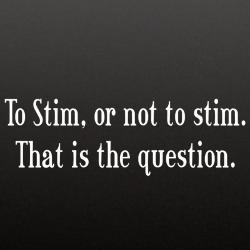My husband and I were introduced to stims long before we knew what they were. Turns out that Brooks had not, in fact, been teething for the first few years of his life, but rather eating his hands (or anything else he could get into his mouth and chew on) in order to calm and regulate himself, the same way you or I might tap a pencil or bite our nails. Except that Brooks went at it like he was on speed.
Back in those early days, we committed ourselves whole-heartedly to gently redirecting his stims—this particular oral one and the many others—into more socially acceptable behaviors. So when he got excited and flapped his arms, we encouraged him to clap his hands instead. Of course, first we had to teach him how to clap his hands. But as anyone with an autistic toddler knows, progress doesn’t come without Herculean amounts of time, effort, and patience.
 Although I have the capacity to be very patient, as a rule, I become much less so after 6pm. I remember one evening when we were visiting friends that I told Brooks “No hands in your mouth” and I physically pulled his hand down. I fully understood that this did not meet the criteria for gentle redirection, but like I said: it was late in the day. My friend, Sue, who is one of the finest parents I know, asked me why I stopped him—what was so bad about him putting his fingers in his mouth? I was honest: nothing. Except that when he does it, all I can see is him, as a grown man, institutionalized because he gnaws on his hands.
Although I have the capacity to be very patient, as a rule, I become much less so after 6pm. I remember one evening when we were visiting friends that I told Brooks “No hands in your mouth” and I physically pulled his hand down. I fully understood that this did not meet the criteria for gentle redirection, but like I said: it was late in the day. My friend, Sue, who is one of the finest parents I know, asked me why I stopped him—what was so bad about him putting his fingers in his mouth? I was honest: nothing. Except that when he does it, all I can see is him, as a grown man, institutionalized because he gnaws on his hands.
As the therapists promised, many of his stims have improved over the years. To be clear, they haven’t disappeared—they tend to hibernate for a while and then reappear, sometimes morphing into new forms. These days, Brooks still puts his hands in his mouth and chews on the neck of his shirt more often than we wish; he runs back and forth (and back and forth and back and forth) when he’s watching a football game or anything else on TV; and although he doesn’t flap his hands exactly, he does this “body shake” when he gets excited that is socially awkward.
I like to think that, over the years, my husband and I have improved our responses to his stims: that our son’s self-esteem can survive our gentle reminders (although, honestly: I’m not sure how happy I would be with someone correcting me all the time, no matter how gentle). We’re certainly more laid-back about it, but no less committed to giving him every possible social advantage without unduly torturing him—we toe the line as best we can.
But I can’t help wondering if we’re getting it all wrong. Last week, the three of us were playing cards and Brooks made an excellent strategy move which, of course, got him up from the table running back and forth (and back and forth and back and forth).
So I playfully said: “Hey, can you please stop galloping around like a horse and play the next hand?” Brooks started laughing hysterically and so did we. Maybe we take a “social advantages, shmocial advantges” approach: this is how he experiences excitement, and as my friend Sue once wisely told me, there’s nothing really wrong with it.
Thanks, Marni, for giving me a moment to step back from my current state of constant reprimanding. I am not sure why I so easily revert to that behavior since I hate myself for it, it doesn’t really work on my son and most importantly, it may be wearing down any self-confidence he has (and we have) worked so hard to achieve. Another thoughtful piece of writing much appreciated.